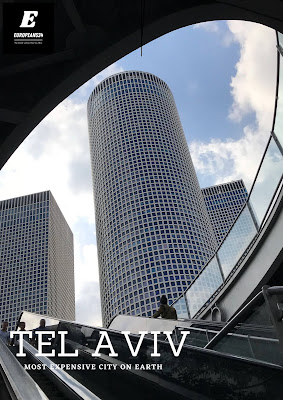Tel Aviv, Israel’s capital, is the world’s most expensive city.
According to the British business magazine “The Economist,” Tel Aviv is currently the most expensive city in the planet. The rest of the world may be unaware of this. Many city residents have felt vindicated in their long-standing criticisms.
For a long time, I’ve been following Tel Aviv’s ascent to the top of the pricing pyramid. These were carefree days when I first got here more than 10 years ago, when you could obtain five shekels for one euro.
I rented a room in a Tel Aviv shared apartment with a balcony, private bathroom, and a short walk to the beach at the time. It was 3,000 shekels at first, then 600 euros afterwards.
When I returned to the city a few years later, I found my former flat share listed on the Internet by my roommate at the time. He now demanded 4,000 shekels for it, which equated to 1,000 euros. Both housing prices in Tel Aviv and the exchange rate of the shekel, the Israeli currency, had soared in only a few years.
Since then, things have only gotten better – and worse – for people who make money in foreign currencies. The rents are very excruciating.
My previous roommate has since moved in with a neighbor after falling in love with her, which is why he no longer promotes my old room in a shared apartment, although the price would have undoubtedly increased drastically again. It’s tough to locate rooms in shared flats for less than 1000 euros in Tel Aviv’s nicer neighborhoods.
Cockroaches in kitchen cabinets are free
You have to put down a lot more money for your own apartment, no matter how little and in need of restoration it is, and it becomes even more ridiculous when it comes to flats for couples and families: A three-room apartment costs between 2000 and 3000 euros, depending on location, and comes with an apartment quality that, to put it mildly, requires some getting used to from a German perspective.
When anything has to be fixed, many landlords either ignore it or insist that the renters pay for it. Only the cockroaches in the kitchen cabinets are free.
The fact that homeowners get away with it is due to the law of supply and demand: there are too few flats and too many individuals looking for them.
This is where the heart of hi-tech industry beats
Despite everything, Tel Aviv is a sought-after city; it is the beating core of Israel’s high-tech economy, and it is the only city in the country to pay exorbitant wages. In addition, the industry is drawing a lot of foreign money.
Anyone who, like me, made the mistake of studying political science instead of computer science in their teens and was also paid in euros is left behind.
How do you deal with the annoyance of excessive prices? It might seem logical to eat out of irritation, but be cautious: Sufganiyot, which are fatty Israeli relatives of the pancake that are eaten during Hanukkah, which is currently, cost three to four euros each piece.
Then perhaps you’d rather to go to the gym and work off your anger? No issue, but for less than a hundred euros a month, it will be challenging. Remember to use deodorant (four to five euros) and shower gel (eight to ten euros) thereafter!
Beer and shower gel costs eight euros in Tel Aviv
Even a cold after-work beer does not provide respite, at least not for the wallet: 0.3 liters for seven to eight euros does not include gratuities, which Tel Aviv servers and bartenders more or less pleasantly request.
After all, bus and rail travel are inexpensive throughout the week, but public transportation is also idle on Shabbat, the Jewish day of rest that begins on Friday evening and concludes on Saturday evening.
Is owning a car a viable option? Only if the bank account cooperates: the Israeli government’s sales tax, which is added to the car price, runs from 80 to 100 percent, depending on the model. Israel is also towards the top of the globe in this regard.
What do we do here, therefore, for all those folks without a programmer’s wage who sign obscene renting contracts, consume five-euro cappuccinos, and even pay twice as much for dog food as in Germany?
However, it is 20 degrees in December, and the beach is open
This is a nice, valid question. I will, without a doubt, respond to them at some point. But now I have to walk to my balcony to enjoy the final rays of sunshine, which I will do in my T-shirt because it is still above 20 degrees in the middle of December. Perhaps I’ll walk to the beach to watch the sunset, on foot, of course, with the well-fed dog accompanying me.
On the way, I’ll take in the city’s unbridled enthusiasm for life, the countless bars, the cheerful, chaotic rush and bustle, and Rabin Square’s massive Hanukkah chandelier. I’ll give thanks to God or fate for allowing me to live here and nowhere else. And perhaps, in the near future, I’ll ask my clients at home for a rise.
The author









+ There are no comments
Add yours